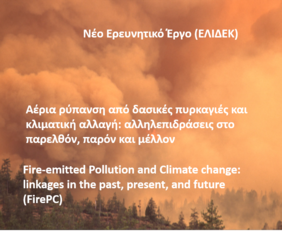A new project titled "Fire-emitted Pollution and Climate change: linkages in the past, present, and future (FirePC)" scientifically coordinated by Associate Professor Apostolos Voulgarakis, has been approved for funding by the Hellenic Foundation for Research & Innovation.
This project will investigate systematically for the first time the atmospheric composition changes and associated climate effects resulting from fire emissions on global and regional scales. The focus will be on short-lived pollutants tropospheric ozone (O3), its precursors (including methane), and carbonaceous aerosols, which are all produced in large quantities from fire. For the first time, we will i) constrain processes translating fire emissions to horizontal and vertical modifications of tropospheric O3 and aerosol abundances using a suite of state-of-the-art observations, and ii) will use improved modelling to investigate fire-driven changes in climate from pre-industrial times to the present-day and into the future. The novel aspects of our methodology are that it involves: a) building an evaluation suite targeting the thorough assessment of processing of fire emissions and the distribution of the resulting radiatively active constituents in models; b) a set of systematic simulations from three state-of-the-art composition-climate models forced by the first past/future multi-model fire emissions estimates. We expect that this study will be a major step in the scientific understanding of the role of fire in the Earth system, and will enable Greece to be at the forefront of this emerging but unexplored research area. The results will be of key interest to policy-makers, leading to reduced uncertainty in climate predictions and providing robust information on the effectiveness of managing fire activity for controlling air pollution and climate change in the future.


